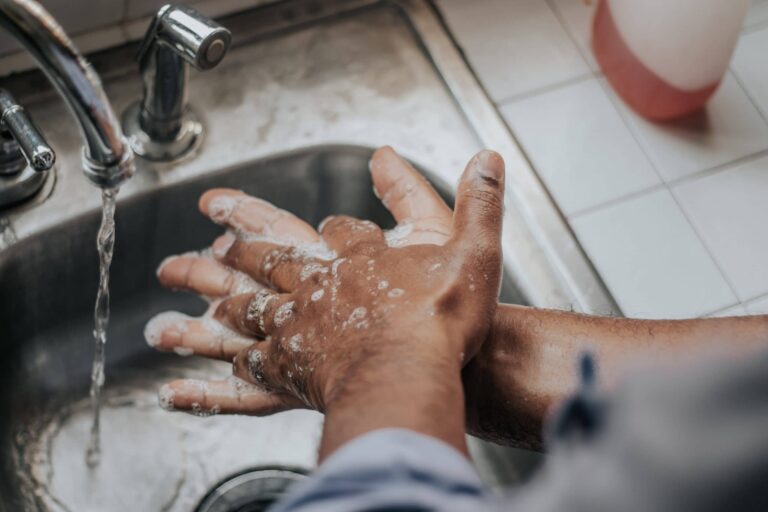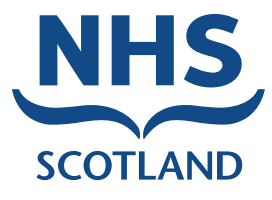Hand care during the pandemic

By Dr Angela Goyal
GP with Extended Role in Dermatology, Clinical Lead for Dermatology and AQP Services
I've had a lot of queries about hand care recently, given we are washing our hands a lot more frequently at the moment.
You might notice your hands are very dry, rough, scaly and cracked. In extreme cases they can feel hot or become fissured; (that is tiny little cuts which can be very painful). Some people may also develop other severe skin problems such as blistering of the skin. Secondary bacterial infection may occur with with staphylococcus or streptococci.
Frequent handwashing with use of soaps and alcohol gels, cleaning surfaces with detergents is taking its toll on our hands leading many to develop Irritant Contact Dermatitis. Healthcare professionals and parents caring for newborns, and people with eczema for example, are at higher risk although we are all washing our hands a lot more currently. More than 10 times a day of washing your hands can be problematic.
The condition is known as irritant contact dermatitis. Imagine the skin barrier layer (the stratum corneum) as a brick wall of cells. It is 1.6mm and about 10 cells thick. It protects the body from the environment. The cement around the bricks are the natural oils – the lipids. Harsh chemicals and repeated contact with water on the skin disrupt this barrier layer; damaging the oils and cell surface membranes.
So how can you protect your hands while still protecting against the transmission of COVID19?
Firstly you must wash your hands in line with government guidance as it is a crucial part of infection control, using soap and water for 20 seconds, i.e. Happy Birthday twice.
We usually recommend soap substitutes to people with this condition but on 23rd March 2020, the British Association of Dermatologist updated their guidance during the coronavirus pandemic. They recommend that even if you have eczema or dry skin, you should 'Wash hands in line with government guidance, using soap and water’.
Dry your hands fully after washing. Moisture left between fingers can cause soreness. Pat the skin dry, don’t rub.
Moisturise your hands as much as you can, especially after you wash your hands. Carry with you a small tube of hand moisturizer and opt for something fragrance free. Don’t use communal tubs of hand cream due to the infection risk. Keep a tube on your desk or in your pocket to remind you to pop a liberal amount on throughout the day.
Before bed use a thicker cream or greasy ointment and apply under cotton gloves while you sleep. This will serve as an intensive treatment and you should notice a difference in the morning.
You can wear gloves over moisturized hands when outside when it is cold. The cold air can further worsen hand dermatitis so this can really help.
When cleaning, washing up, washing children’s hair – anything when in contact with detergents and irritants then wear gloves such as nitrile gloves. But only for a limited time as heat and sweating will worsen dermatitis.
If your hands are very problematic then seek advice from your pharmacist, GP practice or a dermatology specialist. There are medicated treatments available and it is easier to treat it before it becomes too severe. GP’s and specialists are offering telephone appointments – often with photos sent across to assess the skin problem.
We hope this gives you a little help and guidance on how to keep your hands protected during this pandemic.
Photo by Mélissa Jeanty on Unsplash
GP with Extended Role in Dermatology, Clinical Lead for Dermatology and AQP Services
I've had a lot of queries about hand care recently, given we are washing our hands a lot more frequently at the moment.
You might notice your hands are very dry, rough, scaly and cracked. In extreme cases they can feel hot or become fissured; (that is tiny little cuts which can be very painful). Some people may also develop other severe skin problems such as blistering of the skin. Secondary bacterial infection may occur with with staphylococcus or streptococci.
Frequent handwashing with use of soaps and alcohol gels, cleaning surfaces with detergents is taking its toll on our hands leading many to develop Irritant Contact Dermatitis. Healthcare professionals and parents caring for newborns, and people with eczema for example, are at higher risk although we are all washing our hands a lot more currently. More than 10 times a day of washing your hands can be problematic.
The condition is known as irritant contact dermatitis. Imagine the skin barrier layer (the stratum corneum) as a brick wall of cells. It is 1.6mm and about 10 cells thick. It protects the body from the environment. The cement around the bricks are the natural oils – the lipids. Harsh chemicals and repeated contact with water on the skin disrupt this barrier layer; damaging the oils and cell surface membranes.
So how can you protect your hands while still protecting against the transmission of COVID19?
Firstly you must wash your hands in line with government guidance as it is a crucial part of infection control, using soap and water for 20 seconds, i.e. Happy Birthday twice.
We usually recommend soap substitutes to people with this condition but on 23rd March 2020, the British Association of Dermatologist updated their guidance during the coronavirus pandemic. They recommend that even if you have eczema or dry skin, you should 'Wash hands in line with government guidance, using soap and water’.
Dry your hands fully after washing. Moisture left between fingers can cause soreness. Pat the skin dry, don’t rub.
Moisturise your hands as much as you can, especially after you wash your hands. Carry with you a small tube of hand moisturizer and opt for something fragrance free. Don’t use communal tubs of hand cream due to the infection risk. Keep a tube on your desk or in your pocket to remind you to pop a liberal amount on throughout the day.
Before bed use a thicker cream or greasy ointment and apply under cotton gloves while you sleep. This will serve as an intensive treatment and you should notice a difference in the morning.
You can wear gloves over moisturized hands when outside when it is cold. The cold air can further worsen hand dermatitis so this can really help.
When cleaning, washing up, washing children’s hair – anything when in contact with detergents and irritants then wear gloves such as nitrile gloves. But only for a limited time as heat and sweating will worsen dermatitis.
If your hands are very problematic then seek advice from your pharmacist, GP practice or a dermatology specialist. There are medicated treatments available and it is easier to treat it before it becomes too severe. GP’s and specialists are offering telephone appointments – often with photos sent across to assess the skin problem.
We hope this gives you a little help and guidance on how to keep your hands protected during this pandemic.
Photo by Mélissa Jeanty on Unsplash





